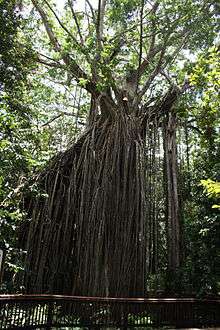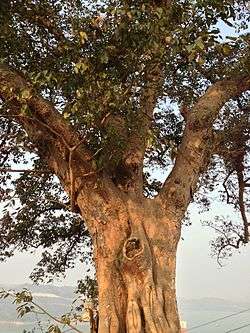Ficus virens
| Ficus virens | |
|---|---|
 | |
| Scientific classification | |
| Kingdom: | Plantae |
| (unranked): | Angiosperms |
| (unranked): | Eudicots |
| (unranked): | Rosids |
| Order: | Rosales |
| Family: | Moraceae |
| Genus: | Ficus |
| Species: | F. virens |
| Binomial name | |
| Ficus virens Aiton | |
| Synonyms | |
|
Ficus infectoria (Miq.) Miq. | |
Ficus virens is a plant of the genus Ficus found in India, southeast Asia, through Malaysia and into Northern Australia. Its common name is white fig; it is locally known as pilkhan and in the Kunwinjku language it is called an-borndi. Like many figs, its fruits are edible. One of the most famous specimens of this tree is the Curtain Fig Tree of the Atherton Tableland, near Cairns, a popular tourist attraction.

Ficus virens var. sublanceolata occurs the subtropical rainforest of northeastern New South Wales, and south eastern Queensland in Australia.
Description
It is a medium-sized tree which grows to a height of 24–27 metres (79–89 ft) in New Delhi and up to 32 metres (105 ft) tall in wetter areas. It is a fig tree belonging to the group of trees known as strangler figs, which is because its seeds can germinate on other trees and grow to strangle and eventually kill the host tree.
This tree has become popular as an avenue tree in and around the cities of New Delhi and Noida.
It has two marked growth periods in its Indian environment: in spring (February to early May), and in the time of the monsoon rains (i.e. June to early September). The new leaves are a beautiful shade of reddish pink and very pleasing to the eye.
This is a very massive tree in which the size of the crown can sometimes exceed the height of the tree. the oldest and most massive pilkhan trees in delhi can be seen inside the complex of the Humayun's Tomb.
Use as food
The leaves are known in Thai cuisine as phak lueat (Thai: ผักเลือด). They are eaten boiled as a vegetable in Northern Thai curries.
External links
| Wikimedia Commons has media related to Ficus virens. |
- "Ficus virens". Australian Plant Name Index (APNI), IBIS database. Centre for Plant Biodiversity Research, Australian Government.